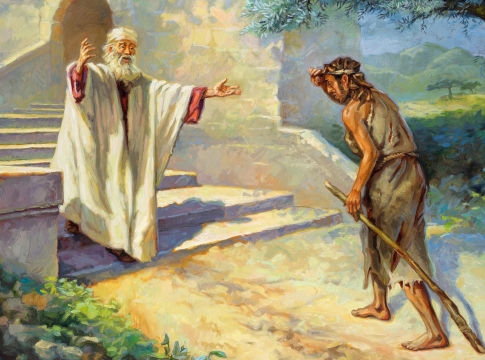
A Christian will most likely quote the Bible every two sentences when discussing his religion. Understanding the meaning and significance of the Bible is essential for anybody interested in God, as it plays a major role in the Christian faith. This article aids in your initial steps.
What is the meaning of the word “Bible”?
Literally meaning “books,” the Greek word βιβλία is where the name “Bible” originates. Christians recognize this collection of religious texts as the infallible word of God.
What is the Bible about?
One particularly special book is the Bible. It is the primary source of knowledge that God has given us about Himself.
What is the basic message of the Bible?
According to the Bible, despite humankind’s disobedience, a loving God created the world and never gave it up. God loved the world so much that He sent his one and only Son, Jesus, so that everyone who believes in him would not perish but instead have eternal life (John 3:16). Please read our article What is the message of the Bible? for more in-depth details on the substance of the Bible.
What is the purpose of the Bible?
God reveals his affection for people and his unwavering principles of justice, kindness, love, truth, and knowledge through his Word. You can learn [what God wants to convey to you] and his plans—not just for this planet, but also for your life—by reading the Bible. In Psalm 119:105, it is said, “Your word is a lamp to my feet and a light to my path.”
Furthermore, the Bible offers a [genuine and trustworthy] description of creation and the “behind-the-scenes” reality, which forms a strong foundation for a Christian worldview. It shows us how we can [be saved] by Jesus Christ and obtain eternal life, and it also helps us understand the world around us and our own predicament as fallen humans.
How was the Bible written?
Christians refer to God’s Word as “the Scriptures” occasionally because it is a collection of books rather than a single work. We refer to these books collectively as “the Bible.”
How many books does the Bible have?
There are 66 books in the Bible. These vary in length (in English versions) from less than 300 words to more than 42.000 words. They include a wide range of literary genres, including poetry, laws, historical narratives, and prophetic messages. To get a concise synopsis of every Bible book, click this image.[1]. The volumes on the lower shelf of the bookcase are New Testament Bible texts, while the books on the top two shelves are Old Testament.
Who wrote the Bible?
Numerous [human authors] have contributed to the writing of the Bible books.There were various individuals who were called by God to share his message, including prophets, doctors, kings, shepherds, fisherman, and an Egyptian prince. These authors authored their books in a variety of social and geographic contexts. While many of the Bible’s books were penned in Israel, others were composed in Babylon or other nations. others of the earliest Bible writings were penned in royal palaces, others among the ruins of Jerusalem, some on solitary islands, and yet others during Israel’s desert trip. The Holy Spirit gave all of these authors guidance while they were penning their books.
When was the Bible written?
The books of the Bible were composed during [many centuries]. Moses recorded the creation of the world in the first book, which dates back to approximately 1500 BC. The first century AD is when the New Testament books were written. These volumes have been gathered and meticulously passed down from generation to generation over many decades.
What language was the Bible originally written in?
It was written in [a number of languages]: the Bible. The books of the Old Testament are mostly written in Hebrew, with a few passages also recorded in Aramaic. Greek is used to write the books of the New Testament.
These days, the New Testament is available in over 5000 languages worldwide, and the entire Bible is available in about 700 languages (for further statistics, visit the Wycliffe Bible translators website). All of these translations are attempts to make the written word of God available to individuals in all languages and countries. They are translations of the original Bible texts as they were recorded centuries ago. Ultimately, God’s will is for everyone to be saved and to learn the truth.(1 Timothy 2:4)
The Bible is unique and authoritative
The Bible is a coherent unity in spite of all this variance. Because it is inspired by God himself, this is feasible. The human authors of the Scriptures were led and inspired by the Holy Spirit to reveal God to us. Take 2 Peter 1:21, for instance: “Man spoke from God while being led by the Holy Spirit; no prophecy was ever produced by the will of man.” Because the infallible God is the true Author of the Bible, his Word is also infallible and inerrant. This suggests that no literature produced by a “ordinary human” could ever have the same authority as the books of the Bible and could ever [replace or supplement] God’s Word. The Bible is distinct.
How is the Bible organized?
The Old Testament and the New Testament are the two collections of books that make up the Bible.
- Scriptures composed before to the human birth of Jesus Christ are found in the Old Testament. These literary works encompass a variety of genres, including the creation account, historical narratives primarily centered on God’s interactions with the Israelites, poetry meditations about coexisting with God, and divine prophecies addressed to either Israel or humanity at large.
- The life of Jesus on earth, including his teachings and miracles, is described in the New Testament. It also includes numerous letters that teach about God and [living as a Christian] to both churches and individuals. A magnificent vision of the future that God has planned for everyone who believes in him closes the New Testament.
How to read the Bible?
Reading the Bible for yourself is the greatest way to become familiar with it. Christians typically engage in something on a regular basis, both [in private] and in groups with other Christians, as in church services. Starting with the book of Genesis if you are reading the Bible for the first time is a good idea. But I suggest you leap to the New Testament and read one of the four Gospels about the life of Jesus, rather than reading everything in order. This gives you a foundational understanding of the other books in the Bible. Please read this article for more guidance on how to read the Bible. In case you are looking for certain Bible texts, [this is a
Why is it important to read the Bible?
The Bible tells us about God’s nature and how to get in touch with Him directly. Knowing God is the only way to eternal happiness, thus knowing him is crucial: “And this is eternal life, that they know you, the only true God, and Jesus Christ whom you have sent.” (John 17:3) “To make you wise for salvation through faith in Christ Jesus” is the power of God’s Word. (2 Timothy 3:15)
Since “all Scripture is breathed out by God and profitable for teaching, for reproof, for correction, and for training in righteousness, that the man of God may be complete, equipped for every good work,” reading the Bible is a [wonderful way to grow spiritually] once you have become a Christian. (2 Timothy 3:16–17)





